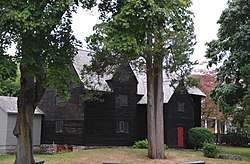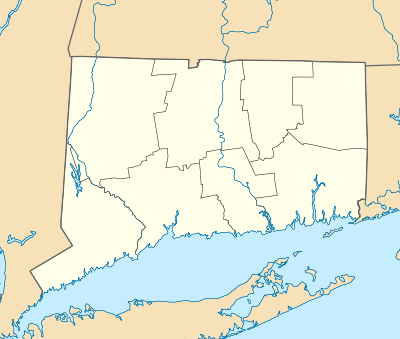Joshua Hempsted House
The Joshua Hempsted House is a historic house museum at 11 Hempstead Street in New London, Connecticut. Built about 1678 and altered several times during the 18th century, it is one of the state's oldest surviving buildings, and provides a virtual catalog of early construction methods due to its state of preservation. The house was acquired by Connecticut Landmarks in 1937,[2] which operates it and the adjacent 1759 Nathaniel Hempstead House as a historic house museum complex known as the Hempsted Houses. The houses have been restored to reflect a late 17th to mid 18th-century appearance, and was listed on the National Register of Historic Places in 1970.[1]
Joshua Hempsted House | |
 | |
  | |
| Location | 11 Hempstead St., New London, Connecticut |
|---|---|
| Coordinates | 41°21′9″N 72°6′8″W |
| Area | 2 acres (0.81 ha) |
| Built | c. 1678 |
| Architect | Hempsted, Joshua |
| Architectural style | First Period |
| Part of | Hempstead Historic District (ID86002112) |
| NRHP reference No. | 70000701[1] |
| Significant dates | |
| Added to NRHP | October 15, 1970 |
| Designated CP | July 31, 1986 |
Description and history
The Hempsted House is located west of downtown New London, on the east side of Hempstead Street between Hope and Truman Streets. It is a 2 1⁄2-story wood-frame structure, with a side-gable roof that has two front-facing gables. The left gable, in an unusual departure for houses of its age, projects forward of the main block, providing an enclosed vestibule on the first floor. Window openings are generally narrow, and filled with diamond-pane casement windows. The interior has exposed framing members that show the building's great age.[2]
The oldest portion of the house was three bays wide, and was a typical one-room structure with a chimney on one end. Although there is some disagreement by architectural historians, it was probably built c. 1678 by Joshua Hempstead, the father of local diarist Joshua Hempsted. It is one of Connecticut's oldest surviving buildings, and has long been recognized for its architectural and historical significance, having been studied by Norman Isham and Frederick Kelly, prominent early architectural historians of the region.[2]
The house supposedly escaped destruction during the 1780 Battle of Groton Heights, in which much of New London was destroyed, because the Hempsteads had prepared a large family reunion meal, which was appropriated by the raiding British forces. It was used as a safe house as part of the Underground Railroad. It remained in the Hempstead family until 1937, when it was acquired by the organization now known as Connecticut Landmarks.[2]
See also
References
- "National Register Information System". National Register of Historic Places. National Park Service. March 13, 2009.
- "NRHP nomination for Joshua Hempstead House". National Park Service. Retrieved 2015-01-26.